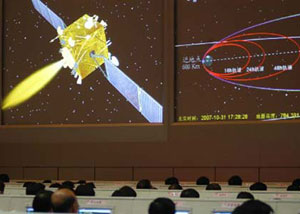China
Planned orbital correction canceled for China´s lunar probe
Source: Xinhuanet | 11-02-2007 08:53
Special Report: Chang'e I -Journey to the Moon |
Scientific working staff watch the screen showing the movement of China's lunar probe Chang'e-1 at the Beijing Aerospace Control Center (BACC) in Beijing, Oct. 31, 2007. Chang'e-1 completes its last orbital transfer before leaving earth on Wednesday afternoon, a critical move to push it to fly to the moon "in a real sense". (Xinhua Photo)
BEIJING, Nov. 1 (Xinhua) -- The first orbital correction for China's first lunar probe, Chang'e-1, scheduled for Thursday, has been cancelled because it is traveling on the expected trajectory, according to the Beijing Aerospace Control Center (BACC).
Chang'e-1 completed its fourth orbital transfer late Wednesday afternoon, shifting out of its 120,000-kilometer orbit around the Earth and moving toward a 380,000-kilometer circumlunar orbit Monday.
"We have been controlling Chang'e-1 in a very precise and excellent manner on its expected trajectory, so we decided to call off the first orbital correction planned for 10:25 a.m. Thursday," said Tong Bin, deputy chief engineer of the BACC.
But Chang'e-1 was still expected to go through one or two orbital corrections before reaching the moon's orbit at 11:25 a.m. Monday, Pei Zhaoyu, a spokesman for the China National Space Administration (CNSA), said Thursday.
Actually, the first orbital correction has been re-scheduled for Friday, said Wang Yejun, chief engineer of BACC.
"BACC will issue instructions to Chang'e-1 to ignite two small engines on board Friday and slightly modulate its trajectory, in a bid to guarantee that the satellite travels on the pre-set orbit," Wang said.
A second orbital correction might be carried out Sunday, Wang said.
He said that BACC collaborated with the European Space Agency (ESA) Thursday to observe and control Chang'e-1 and all information received from ESA's tracking station network showed that the moon orbiter was operating normally.



